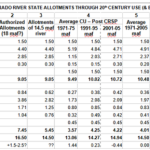
I would be remiss in whatever responsibility I feel to the Colorado River if I did not remind you of the implications of the coming election for the river and our future with it. I don’t say ‘the future of the river’: the river will always be here in some form or another, but we may not always be here interacting with it – certainly not 40 million of us taking it for granted. And this election, like the last one – and probably the next one, if there is a next one – are and will be playing a determinative role in which way our future with the river goes.
At some point, the American people have got to seriously confront the fact that phenomena like Hurricane Helene, heat domes, town-consuming wildfires and an enduring drought are climate-driven consequences of the way we do civilized life, and they will only get worse if we don’t do something to change the way we do civilized life in the immediate future. They might in fact eventually make civilized life as we know it impossible to sustain.
Our climate-driven drought in the Colorado River Basin is not so TV-dramatic as the blowing apart of houses by a hurricane, or thirty inches of rain in roughly the same number of hours on the inland – inland! – mountains of North Carolina, or whole towns being burned over by mega-wildfires, but the relentlessly rising global temperatures are costing our river, with so much of it ‘spread out to dry’ in reservoirs, open canals and desert farms, around 5-6 percent of its over-committed water for every degree Fahrenheit. Our river is now running roughly a fifth less water than it ran in the 1980s and 90s, with at least half of that charged to the climate crisis, according to students of the river like Brad Udall and Jonathan Overpeck.
We made a good choice in the last election; we elected a president who takes this challenge seriously – or at least more seriously than his opponent who denies that it is even happening. President Biden has done more than I ever imagined he would able to do, with what amounted to a one-percent mandate and blatantly reactionary Congressional opposition all the way. That he managed to get the trillion-dollar ill-named ‘Inflation Reduction Act’ through those obstacles was amazing: our first big step toward addressing the existential climate problem.
That being the case, a positive step forward, one might think that the ship of state, that vast oil tanker, is finally beginning the long slow turn toward really tackling the huge menu of changes that must happen if we are to at least stop making the problem worse, and maybe eventually reversing our using the atmosphere for another public dump….
But no! We are now having basically the same election we had four years ago – the same basic stances on the climate issue: one candidate trying to take the challenge seriously without frightening us too badly; and the other candidate, the same TV-fantasy character denying it all. And the election has come down to focusing on all of the same problems manufactured last time to divert us from our big problems – fiddling while Rome smolders. And unbelievably, despite Biden’s achievements, the margin of victory or loss is projected to be about the same….
If Trump is elected again – again probably by the Electoral Cabbage, not the majority of voters – this time he would come at the fore of a phalanx of ultra-conservatives smarter and better organized than their ‘very stable genius,’ with their Project 2025 plan already laid out in some detail. Exploring the plan, there is not much in it that would directly impact the Colorado River, except for the general promise to replace all federal employees who don’t ride blindly for the Trump brand with loyal conservatives who filled out the ‘Project 2025’ form establishing their conservative creds.
The Interior Department segment was authored by William Perry Pendley, who was Trump’s director of the Bureau of Land Management, and who refers frequently in the plan to his own book, Sagebrush Rebel: Reagan’s Battle with Environmental Extremists and Why It Matters Today, so there should be no surprise in whom his planning favors in the West’s ongoing public-private, federal-state land and water disputes. His plan calls for the Bureau to increase storage options, which is consist with the wishes of many entities along the river, although no one is sure where the water to be stored would come from.
But the main focus of Pendley’s Interior plan is action steps for developing all of the nation’s energy resources (yes, including coal), opening up virtually all public lands for energy production as quickly as possible, feeding the fiction that America was really great before the growing economic juggernaut was fitted with any brakes or steering, and could run off in all directions full tilt boogey with the sky the limit. Wups. We’re already pushing the sky’s limits, aren’t we…. Each year more atmospheric dumping than during previous years…. But in the MAGA world, we won’t be worrying about that.
The 2025 Energy Department chapter has perhaps the most to do with not-addressing the climate crisis. An early step there would be lobbying Congress to repeal both the Infrastructure Investment and Jobs Act and the Inflation Reduction Act, and rescind all funds not yet spent. All of the offices in Energy that have to do with renewable energy, clean energy, energy efficiency, carbon management and anything else intended to chip away at the climate crisis would be either eliminated entirely or starved down to what would fit in Grover Norquist’s bathtub. In essence, undo, as quickly as possible, all the positive work not just of the past three years, but of the 21st century to date.
Why would any citizen with any awareness at all of planetary reality even be thinking about voting for Trump and Project 2025? Yet if the polls are to be believed, roughly half of the probable voters are going to. Why?
The only explanation I can think of involves Elizabeth Kubler-Ross’s five-stage ‘grieving process’ that we all go through in confronting and finally accepting a major loss or big unwelcome change in our lives. First, a period of denial, of saying this (climate crisis) can’t be happening here, it just can’t. Second, anger as it becomes too difficult to ignore that it is in fact happening, and – it has to be somebody’s fault, somebody else. Third, negotiation as we try to figure out how to make the change or loss less bad than it looks like it would be if we continue to do nothing but piss and moan, or try to ignore it. Fourth, depression as reality sets in when the negotiations only reveal their inadequacy in trying to resolve the challenge painlessly. Fifth, then, is acceptance, finally trying to work out how to go forward without that which is lost, with what is left, how to make a little lemonade from the lemon we’ve imposed on ourselves….
In that process, most of us are in one of the first three phases. Too many of us are still in denial that the climate is changing at all from the mellow Holocene to the much less mellow Anthropocene (‘the weather is always changing!’). Trump is banking on that – but he is also right there for those who have moved on to the anger phase, the desire to find someone or something (other than themselves) to blame for changes they can no longer totally deny. Trump’s specialty is blaming everyone else, and exhorting others to join him in that.
Those of us who accept the scientific evidence and know that we have to learn to live with climatic changes are moving beyond anger to the negotiating phase (the ‘Inflation Reduction Act’): how can we deal with this and still have the good life we had before it came down on us? More solar panels on the roofs, electric heat pumps to replace the gas furnaces? Electric cars so we don’t have to give up that iconic foundation of modern life? Et cetera.
But when we get into serious negotiation, to the extent of looking at the hidden costs underlying the obvious benefits, it is hard to avoid the slow slide into depression at the undeniable fact that the cost to the atmosphere of the technological fixes necessary to maintain life as we know it will be nearly as bad as just continuing to do what we are doing….
It’s a long road to finally accepting the fact that we’ve killed the mellow Holocene past, and life is just going to be different in the Anthropoceme, but we’d best just get about salvaging what we can. Me and my trusty automobile and house built when America was great – we’re not there yet. We’re still negotiating, solar panels on the roof, biking and walking more, growing a little food, but….
Trump and MAGAstalgia are only still in the election because so many of us are still in the denial and anger stages. A related reason is Trump’s fox-clever exploitation of our anger at the reality we’re trying not to face. Trump is a master at orchestrating anger around the belief that our problems are caused by someone else; MAGA is grounded in xenophobic fear of The Others – those not like us white guys who built America (never mind that we was built it on the backs of The Others).
The growing pressure on our southern border by immigrants is his immediate focus for xenophobic fear and anger. Call it racist if you want, the nonsensical claims that this is due to Latin American nations sending their entire criminal class to the United States. But no one seems to want to talk about the extent to which this surge in people trying to escape to El Norte from the Latin American nations is just one more impact of the global climate crisis – the beginning of ‘climate change migrations’ that will continue to increase so long as the still somewhat United States of North America remain a symbol of hope for those without hope at home.
If you are interested in the real reason why there is growing pressure on the southern border, check out United Nations reports from the World Meterological Organization on ‘The State of the Climate in Latin America and the Caribbean,’ which highlight ‘the far-reaching repercussions of the climate crisis in those states for ecosystems, food and water security, human health and poverty.’ No mention of murderers and rapists, just poor people looking for the opportunity to get a life, and willing to walk a thousand miles for a thin chance at that. Donald Trump will never understand – or exhibit – that kind of courage.
But that just brings us back to the fact that, sooner or later and better sooner, we are going to have to begin to commence to proceed to do something about the climate crisis. But a nagging question arises in my mind about that mandate that is as bad to contemplate as is accepting the reality of the climate crisis: is a somewhat democratic nation-state systemically capable of addressing something this big? Can you imagine a candidate running for office on this platform: ‘Okay, folks, it’s time to bite the bullet. We are seriously undermining the planet’s life support systems, and ultimately it be too much for us to survive. So we need to start now to change the way we live dramatically in order to level out at changes merely bad for our lifestyle, rather than proceeding as we are toward changes that will terminate our lifestyle….’ In other words, a candidate just saying what the vast majority of our scientists are saying, with evidence to support their claim. But who is going to vote for that candidate?
Back around the turn of the century when I was teaching Environmental Studies at the college here, I would bring up what we knew, or thought we knew, about what was then called ‘global warming’ with the students, and invite them to take it on for their research paper. Few did (wilderness issues and tails for outdoor recreation were so much more interesting), but one student wrote the facts into a story in which a dictator took over our governance, but rather than behaving Trumpishly like dictators tend to, this one used his power to force the people to change their lives the way the scientists said we need to. The mythic benevolent despot.
At about that same time, in 1989, philosopher of science James Burke (I don’t know what else to call him) produced a ‘story’ video called ‘After the Warming,’ in which all the nations of the world, including the United States, submitted to a ‘planetary council’ that oversaw a global plan for the reduction of carbon gases in the atmosphere (then at only 360 parts per million, now around 420ppm). This plan was enforced by international agreements to not trade with nations that did not participate. The USA of course held out until an extended drought brought us to our knees. I showed that to classes, to no visible effect – and it didn’t really make me voluntarily change my ways; it just gave me another reason to beat up on my slackass self.
So – can democracy work for this kind of change? Or are we all waiting for someone to make us behave? Behave as though we really did love our planet, and wanted to try to get it and us back toward that great old mellow Holocene world again, rather than beating us up with storms, droughts and mega-wildfires?
Well – enough. Vote, as if our future depended on it. Vote for the people that are at least trying to lead us beyond denial and anger at what we’ve unconsciously done to ourselves.
Next post, back to the Headwaters and the search for the missing 90 percent of our precipitation in the Colorado River Basin.




Thanks George. A well thought-out and excellent article.
I would add that we have had very little times of functioning government since the Nixon-Atwater southern strategy AFTER Nixon was forced to make environmental investment. And now we are in the 44th year of the Reagan project to dismantle government and thus democracy. No wonder you have doubts. Seems like all the work so many of us did for a better society just never had a chance under the [mostly] minority rule Republicans. And this is directly the fault of our fearful founders and the many minions who idolize them falsely for so many years.
This is so scary:(
Indeed, the next couple of weeks will be “interesting,” and – depending upon what’s presented to us by the next couple of weeks – the next couple of years after the election might be even more so. What’s that phrase? “May you live in interesting times?” I think we’ve arrived, like it or not.
Great!
George – thanks for addressing the issue directly, including the politics and choices. I heard from Harry P that you were visiting Madison and would have welcomed a chance to meet. But I’m off to Cuba hoping not to encounter more hurricane activity- and even catch some fish! Here’s hoping the election results involve a win for our planet, people and watersheds.
Thank you, George! It is vital to continue thinking about how we are living and what we
are accepting, and not accepting. Our own actions are definitely part of the whole, rather than anything always being somebody else’s fault. It definitely takes a kind of courage, others do know, to face difficult decisions and in daily ways. Our present and future this election inexorably depends on our vote. Barbara
Thought provoking as usual, George. I ended the piece wondering if hydrogen fueled ‘cars’, which are widely thought to be the successors to the lithium battery powered all-electric and even the hybrid cars of the present, would – with nothing coming out of their ‘tail pipes” but water vapor- be a step in the ‘right’ (correct, not MAGAT) direction?
as always, an excellent discussion, reflection.
our tech fixes won’t fix things in the face of climate catastrophe, but a few of us in the US can hold out and live off our high standard of living, which will inevitably decrease.
as Dolores LaChapelle would say, with a wry smirk, “it’s hopeless.” and it is. but one can still hope for miracles in the face of disaster. and work towards that, as long as we are able.
Beautifully said, George! Way to go!
BTW, I’m still trying to negotiate a time to get down there and give you a copy of the final book . ken
Another fine piece, George. I find your Kubler-Ross angle particularly interesting–and new, to me, anyway. We are indeed at yet another existential election; chances are there will be another in four years, and . . . . Folks of our ilk keep asking “How can anyone vote for him?” That’s easy: They had been there, in their racist, xenophobic closets, all along; he merely provided the means for coming out. He is, indeed, their kind of leader. Regardless of who wins on Tuesday, Trumpism will not be going away for a long time, if ever. The Repugnican Party has happily made its deal with its devil. I can’t be hopeful for a nation where 74 million people voted for Trump THE SECOND TIME! As for the environment: no, American “democracy” won’t take the necessary actions before it is too late. We are too rich and selfish.
All that’s left to do now is watching the MAGA Trinity rip down, throw back, shred and undo many accomplishments – listed in George’s columns – that we’ve cherished. Greetings from an annoyed US voter in Switzerland. Looking forward to read more from George about the River and the world.
Thank you for the clear-eyed holistic perspective and contextual perspective!! Especially on my post-election reading.
I’m curious how we may accelerate our collective journey through Kubler-Ross’s five-stages…
And, despite apparent present trends, I’ve look felt that rather naming our era the Anthropocene, the Ecocene is more appropriate. It is an aspirational reminder, more of a North Star. And… ‘Nature bats last’, anyway.
Deep gratitude.
Pingback: Romancing the River: Learning to Live in the Anthropocene | Sibley's Rivers